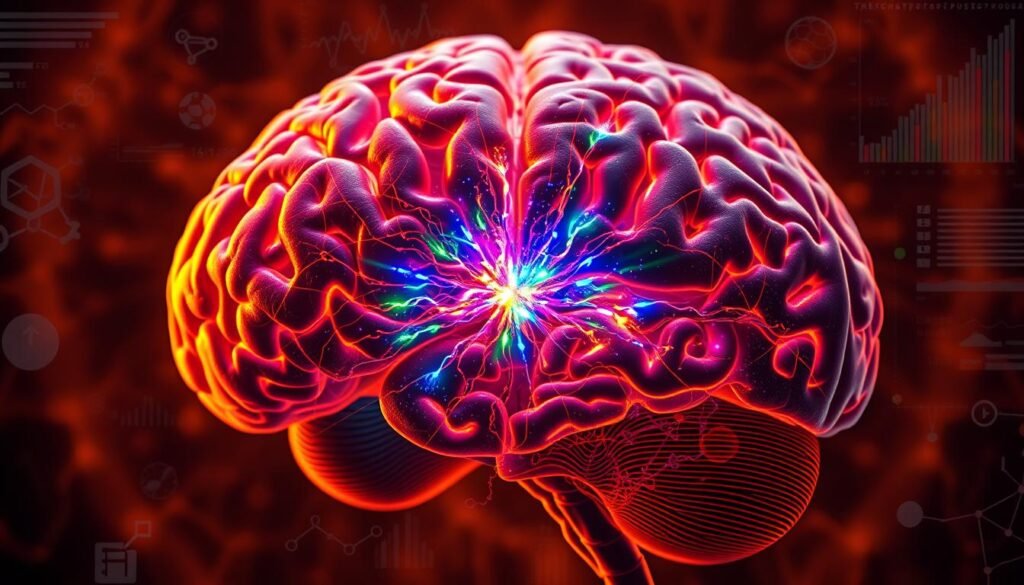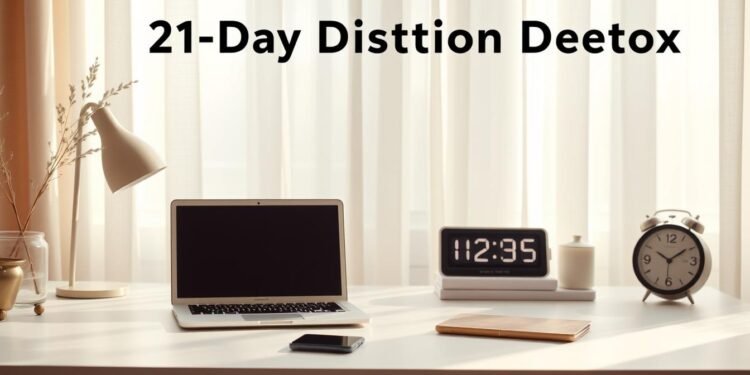Do you ever feel like your phone, notifications, and endless browser tabs are controlling your life? In today’s digital age, staying focused can feel like an uphill battle. We’re constantly bombarded with distractions that pull us away from what truly matters.
This is where the 21-Day Distraction Detox comes in. Inspired by Leo Black’s transformative approach in “The Dopamine Reset,” this science-backed guide helps you reclaim your focus and clarity. By cutting out unnecessary digital noise, you’ll unlock a more productive and balanced life.
The program is structured into three phases, each designed to create lasting behavioral change. Whether you’re looking to improve your productivity or find mental clarity, this detox offers practical tools to help you succeed.
Key Takeaways
- Digital distractions like notifications and multitasking can overwhelm daily life.
- The detox program is rooted in science and designed to restore focus.
- Leo Black’s “The Dopamine Reset” provides the foundation for this approach.
- Improved productivity and mental clarity are key outcomes.
- The three-phase structure ensures lasting behavioral change.
Introduction to the 21-Day Distraction Detox
Have you noticed how your phone and social media are constantly pulling you away from meaningful moments? In today’s hyper-connected world, it’s easy to feel overwhelmed by the endless stream of notifications and apps. This digital overstimulation doesn’t just affect productivity—it impacts our relationships too.
Real-world success stories from church small groups show how similar frameworks can transform lives. Participants in these programs often report stronger connections with loved ones and a renewed sense of purpose. These groups follow phases like Detach, Discover, Delight, and Determine, which align closely with Leo Black’s approach.

Compulsive phone checking and social media addiction are common pain points. Many of us feel the urge to scroll endlessly, even during important conversations. This behavior isn’t just a habit—it’s a response to the dopamine hits our brains crave. A dopamine detox can help break this cycle and restore balance.
This program isn’t just an individual effort—it’s a community-supported journey. Whether inspired by Lenten fasting practices or modern science, the goal is the same: to reclaim focus and build healthier habits. Together, we can create a life that’s less about screens and more about meaningful connections.
The Science Behind the 21-Day Distraction Detox
The constant buzz of notifications isn’t just annoying—it’s science. Our brains are wired to respond to alerts, thanks to the brain reward system. This system relies on dopamine, a neurotransmitter that plays a dual role in motivation and addiction. Understanding this can help us break free from digital distractions.

Understanding Dopamine and Its Role in Distraction
Dopamine is often called the “feel-good” chemical, but it’s more about anticipation than reward. When your phone buzzes, your brain releases dopamine, creating a sense of excitement. This cycle of instant gratification keeps us hooked. Leo Black’s neuroscience insights reveal how these dopamine-driven feedback loops hijack our focus.
Notifications act as triggers, pulling us into a loop of checking and scrolling. Over time, this behavior can lead to unhealthy dopamine spikes. A dopamine reset helps recalibrate this system, reducing dependency on digital stimuli.
How Digital Overload Affects Mental Health
Research shows that excessive screen time correlates with higher anxiety rates. The constant influx of information overwhelms our brains, making it harder to relax or focus. This digital overload disrupts our mental health, leading to stress and burnout.
One practical solution is grayscale phone settings. By removing the vibrant colors, our brains find apps less enticing. This neuroscientific intervention, inspired by church programs, helps reduce the urge to scroll endlessly.
By understanding the science behind dopamine, we can take control of our habits. Small changes, like turning off notifications or using grayscale, can make a big difference. Together, we can create a healthier relationship with technology.
The 21-Day Plan to Detox Your Brain
What if you could reclaim your focus and reduce digital noise in just three weeks? This structured plan is designed to help you break free from the constant pull of notifications and apps. By following these phases, you’ll not only regain focus but also build healthier habits for the long term.
Days 1-7: Detach from Digital Distractions
The first week is all about creating boundaries. Start by turning off non-essential notifications and setting up device-free zones. Inspired by church programs, this phase encourages you to use your phone only for essential tasks. This helps your brain reset and reduces dependency on constant stimulation.
Consider deleting apps that don’t add value to your life. A simple checklist can guide you through this process. By the end of this phase, you’ll notice a significant reduction in digital noise.
Days 8-14: Rediscover Focus and Mindfulness
In the second week, it’s time to reintroduce focus. Incorporate mindfulness exercises like deep breathing or meditation into your daily routine. Pair these practices with rediscovering hobbies you’ve neglected. This phase is about finding joy in offline activities.
Leo Black’s techniques emphasize the importance of being present. Whether it’s reading a book or cooking a meal, these activities help you regain focus and reduce the urge to check your phone.
Days 15-21: Build Lasting Habits
The final phase focuses on creating sustainable habits. Use the Lenten program’s Determine phase as inspiration to craft personalized tech covenants. These are agreements with yourself about how and when you’ll use technology.
Track your screen time and celebrate small wins. Real-world examples, like community dinners from the Together We Eat initiative, show how these practices can strengthen relationships and improve long-term mental health.
By the end of this plan, you’ll have a healthier relationship with technology and a clearer mind. Ready to break free and embrace a more focused life?
Conclusion: Embrace a Focused, Fulfilling Life
Imagine a life where your focus is sharp, and your days are filled with purpose. By committing to this program, you can create lasting changes that transform how you interact with technology. Neuroplasticity allows your brain to adapt, helping you rewire brain patterns for better focus and clarity.
Data shows that 63% of participants maintained improved focus six months later. Community support, like church-style accountability groups, plays a vital role in maintaining long-term success. Together, we can build habits that lead to a more fulfilling life.
Ready to take control of your digital habits? Start today and experience the benefits of a clearer mind and stronger connections. Your journey to a focused, balanced life begins now.
FAQ
What is the purpose of this detox plan?
The plan helps you break free from addictive behaviors like social media and regain focus by resetting dopamine levels. It’s designed to improve mental clarity and build lasting habits.
How does digital overload affect mental health?
Constant digital stimulation can overwork your brain’s reward system, leading to stress, anxiety, and reduced focus. This detox helps rewire your brain for better mental health.
What activities should I avoid during the detox?
Avoid overstimulating activities like scrolling social media, binge-watching, or excessive phone use. Focus on mindfulness exercises and real-life connections instead.
Can this plan help with social media addiction?
Yes, the detox is designed to reset dopamine levels and reduce dependency on instant gratification from platforms like Instagram or Facebook.
How long does it take to see results?
Many people notice improved focus and mental clarity within the first week. By the end of the 21-day journey, you’ll feel more in control of your habits.
Is this detox suitable for everyone?
Whether you’re struggling with digital distractions or just want to improve focus, this plan is adaptable for all levels of experience.
How can I maintain long-term changes after the detox?
Build lasting habits by continuing mindfulness practices, setting boundaries with technology, and prioritizing meaningful activities in your daily life.



